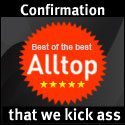Health Care Blog Aggregator, New Blogs of Note
Quality health care blogs have been springing up all over the place lately. Reading this post by a fellow Chris Locke fan (we're both old subscribers to his email called Entropy Gradient Reversal), it was clearly time to take account of developments in the blogosphere.
First off, the 2005 Medical Blog Awards at MedGadget were handed out this week. Congrats to the winners, especially Random Acts of Reality, who took two categories (Best Medical and Best Literary Medical Blog) and HIStalk in the Best Medical Technology/Informatics category.
Next are some new blogs. First up is the blog EMR and HIPAA where John keeps up with all things EMRish. Next we have a very specialized blog Lab Soft News dealing with clinical lab automation. Finally, we have the HIT Transition blog - this is another hard core HIT blog that looks at claims, coding and health care delivery. You'll see all of them on my Blogroll soon.
Finally we have the brain child of Shahid Shah, The Healthcare IT Guy, the HITSphere. This site is an aggregator that takes the RSS feeds from those funny little orange buttons you see from time to time and presents you with headlines from over 20 medical blogs, all on one page.
Oh, and one last thing. A bunch of us bloggers are getting together informally (that means you pay for your own food and drinks) during HIMSS. This unsanctioned event will be held February 12, Sunday evening, starting at 8:30pm. The location is still TBD - I've gotten a couple good suggestions, send me yours.
Read MoreRadiologists Refute Medication Safety Study Findings
Predictably, the American College of Radiology (ACR) has issued a press release in response to yesterday's release U.S. Pharmacopeia (UPS) about medication errors in radiology. After calling the study “incomplete, inaccurate,” the ACR said the study could, “cause needless alarm for patients.” Rather than argue the facts, the ACR raises the issue context:
missing from the USP claims, stating that of the more than 2.5 billion
imaging procedures that took place from 2000-2004, the report only
cites 2,030 which represents an error rate of just 0.00008 percent.
This rate, ACR states, is 3,700 times better than the lowest
hospital-wide medication error rate of 0.3 percent.
Adding insult to injury, the ACR notes that the vast majority of catherizations are done by those cowboy cardiologists and not radiologists. The RSNA gets a bit defensive, noting that the medication
errors addressed in the USP report “don't relate specifically to
radiology, or at least are not under a radiology department's control.”
So there.
Read MoreChaos in RFID Market
In health care, RFID is not a product. No, really, it's not. Instead, think of it as enabling technology.
In wholesale distribution, retail or manufacturing you have enterprise-wide vertical applications where one might buy an RFID system to track merchandise or parts. In hospitals there are multiple RFID applications with specialized requirements. Because of these specialized requirements, hospitals buy the application first, and RFID second.
These applications include hospital patient flow, infant security systems, and departmental information systems for the OR and ED. Vendors in each of these product categories have integrated RFID capabilities into their products; depending on the age of their product, they may have developed their own indoor tracking system. At this point, I think it is impossible to buy a product from each category and have them all work with the same RFID system.
The health care market is adopting RFID with pilot projects using different technologies. At some point, the market's going to wake up and see unnecessary duplication that must be replaced by an enterprise solution. This “complication” won't stop any early innovators from adopting RFID, but it must be resolved before the early majority of the market will “cross the chasm” and buy RFID.
In some markets, RFID capability will become a lock-out spec long before RFID sees major market adoption. The challenges for both vendors and buyers are considerable; those that execute well will be the ones to reap competitive advantages.
Read MoreRemote Monitoring Startup Closes $10.1 Million Series B Round
The remote monitoring space is heating up, what with companies like ADT, Intel, and Philips moving in, and VCs funding startups. Living Independently will use the funds for sales and marketing, product development, and expansion into the UK.
The company has a system that uses motion sensors strategically placed in the home, monitoring software that analyzes daily activities and the ability to alert caregivers when any suspicious diversion from daily routines is observed. Current buyers are assisted and independent living facilities, homecare agencies, hospitals, and HMO's, and individuals in their homes. Direct-to-consumer sales are done by ADT, a division of Tyco (it will be interesting to see where ADT ends up in the Tyco break up).
[Hat tip: FierceHealthcare]
Read MoreAerotel Medical Signs Canadian Dealer
With the recent approval by Health Canada for reimbursement of ECG loop event recorder studies, Israeli firm Aerotel is entering the Canadian market. Aerotel has signed Ameda Medical Technologies distribute their products. Aerotel makes a variety of telemedicine products including ECG, weight, blood pressure. Remote connectivity is done via phone, Bluetooth and broadband Internet connections.
Read More


